Let’s face it—we’re probably not getting out of this pandemic anytime soon. I hope everyone is taking suggestions from my fellow VOXers to find ways to be productive throughout these long, monotonous days. However, with the Spring Semester ending, I know that a lot of people will have even more free time very soon. To avoid falling back into a bored, unmotivated rut, here are some books (for my readers out there) that could provide food for thought during quarantine and beyond.
“Dark Matter” by Blake Crouch
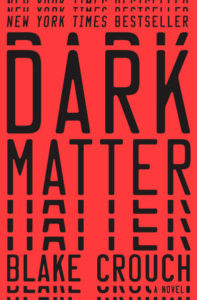 Ever thought about the road not taken? What if you got what you always wanted, but everything you ever loved leading up to that ceased to exist? If I haven’t already scared the hell out of you with those demoralizing questions, “Dark Matter” might do the job and worse. Set in Chicago, Illinois, Blake Crouch begins this tale with the kidnapping of 40-year old Jason Dessen, a married father of one and physics professor.
Ever thought about the road not taken? What if you got what you always wanted, but everything you ever loved leading up to that ceased to exist? If I haven’t already scared the hell out of you with those demoralizing questions, “Dark Matter” might do the job and worse. Set in Chicago, Illinois, Blake Crouch begins this tale with the kidnapping of 40-year old Jason Dessen, a married father of one and physics professor.
After being taken to an unknown location, drugged, and interrogated, Jason wakes up to discover he’s been missing for over a year and, as a renowned scientist, he now has everything he ever wanted in life. Only now, he isn’t married, his son doesn’t seem to exist, and the college of his profession has no record of him ever working there. Confused and paranoid, Jason begins to doubt whether the world he knows or the world he wanted is real. This leads him on a remarkable and daunting journey to find his wife and son and confront the man who kidnapped him.
Blake Crouch is an ingenious novelist who doesn’t waste your time. Only fifteen chapters long, “Dark Matter” is a grounded, character-driven take on how the choices we make affect where we end up. Balancing mystery, romance, and believable science fiction with its uniquely simple style of writing, I think this book is a must-read for everyone.
“Station Eleven” by Emily St. John Mandel
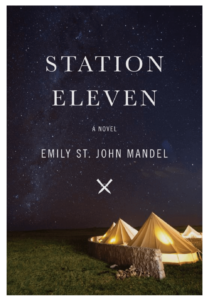 For our younger reading audience still trying to process the concept of global pandemic, here’s a fun, original take on our current predicament that will show you what can happen when nobody takes the signs of a coming plague seriously.
For our younger reading audience still trying to process the concept of global pandemic, here’s a fun, original take on our current predicament that will show you what can happen when nobody takes the signs of a coming plague seriously.
It’s Year Twenty, and the last of humanity that survived the Georgia Flu (what a nice name!) lives in isolated towns and villages amid the ruins of civilization. While most people have settled down in need of food and security, there are still nomadic groups who wander the empty stretches of highway. The Traveling Symphony is one of these groups, going from town to town performing classical jazz and the plays of Shakespeare.
I recently picked this one back up because, in lieu of the past month, I didn’t really feel like reading in fiction what I was seeing happen in real life. But it has an interesting premise and a large network of loose character connections that span pre- and post-pandemic years. “Station Eleven” really plays with the concept of performing arts surviving the apocalypse in some pretty cool ways, and the author’s passionate descriptions of some of the scenes where the performers are actually on stage—mind you probably in the parking lot of an abandoned Walmart or half-collapsed high school gym—are surprisingly touching. I’d recommend this one to younger readers because despite the bleak premise, it’s not as heavy as some of the other books in this list. Speaking of emotionally heavy…
“Parable of the Sower” by Octavia Butler
For those of you unfamiliar, anything written by Octavia Butler is essentially a must-read. At least for me, an aspiring writer who, for a long time, didn’t know of any black authors writing post-apocalyptic fiction. Then I heard about this novel, the first of two books in Butler’s final, incomplete saga that I genuinely believe could have transformed literature of this millennium.
“Parable of the Sower” is a 1993 science fiction novel that follows the spiritual journey of Lauren Oya Olamina, a teenage girl living in a gated community outside of Los Angeles. The year is 2024, education has become almost exclusively elite, and the value of the U.S. dollar is perpetually falling. With economic inequality and climate change making life in impoverished areas nearly impossible, Lauren and several survivors from her community join a mass migration north up Highway 101 in search of a place to start her controversial ideology.
As hard as it is to put this book down, I had to pick it back up a few times. Like I said, this is an insanely heavy work of fiction. “Parable of the Sower” is told through the protagonist’s daily journal entries, and a lot of what Lauren sees on a daily basis in this not-too-distant world isn’t necessarily pretty. I was recommending it before COVID-19 and I highly recommend it now. It’s speculative fiction that presents a frighteningly inevitable fate, and it’s up for the reader to decide whether or not we believe in the solutions it offers.
“The Themis Files” Trilogy by Sylvain Neuvel
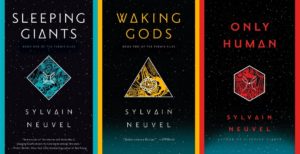 Not fond of traditional prose when you read? Canadian author Sylvain Neuvel puts a fascinating spin on the science fiction genre reminiscent of works such as “The Martian” (Andy Weir) and “World War Z” (Max Brooks). “The Themis Files” trilogy—consisting in order of” Sleeping Giants,” “Waking Gods,” and “Only Human”—tells the story of a top-secret initiative dedicated to unearthing and studying a series of lost, scattered artifacts: giant metal body parts of a 10,000-year old 20-story tall humanoid robot.
Not fond of traditional prose when you read? Canadian author Sylvain Neuvel puts a fascinating spin on the science fiction genre reminiscent of works such as “The Martian” (Andy Weir) and “World War Z” (Max Brooks). “The Themis Files” trilogy—consisting in order of” Sleeping Giants,” “Waking Gods,” and “Only Human”—tells the story of a top-secret initiative dedicated to unearthing and studying a series of lost, scattered artifacts: giant metal body parts of a 10,000-year old 20-story tall humanoid robot.
Divided into literal files, Neuvel weaves complex character arcs together through journal entries, mission logs, and conversations had with a mysterious, unnamed interviewer whose ridiculous level of international notoriety slowly reveals the true origin, intent, and fate of the rediscovered alien robot Themis.
Despite a lot of hard scientific and political jargon, “The Themis Files” holds together a well-rounded story with interesting, believable characters, realistic conflict and consequences, and posing questions about humanity and our place in the universe.
“Walden” by Henry David Thoreau
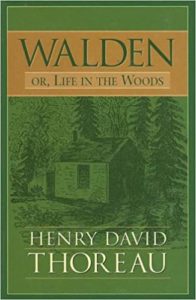 No, seriously. I know what you’re thinking—if you haven’t read this book for class already, you don’t want to read it at all. Trust me, I agree. But despite Thoreau’s very mundane account of voluntary self-isolation, I think that the concept of transcendentalism is definitely something we need to consider.
No, seriously. I know what you’re thinking—if you haven’t read this book for class already, you don’t want to read it at all. Trust me, I agree. But despite Thoreau’s very mundane account of voluntary self-isolation, I think that the concept of transcendentalism is definitely something we need to consider.
Transcendentalism, in a nutshell, is achieving a state of conscious bliss by being in harmony with both community and nature. It’s not a popular belief in the modern era, primarily because it is seen as unrealistic based on the material, Westernized way we live now. While the philosophy only dates back to the early nineteenth century, indigenous populations were practicing its core beliefs for millennia.
If you don’t want to spend all day learning about Thoreau’s civil disobedience or the seasonal flora and fauna of Walden Pond, I recommend “Walden Two” by B.F. Skinner because it has more of an actual plot—the reason it’s not listed is because the primary focus of the book is how social conditioning can perfect a population. Too soon.


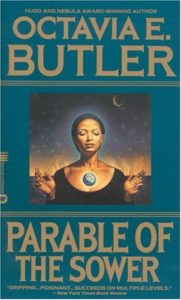



I read Parable of The Sower for a school assignment and I agree that it is a good book and very important in this covid-19 reality *mind blown*